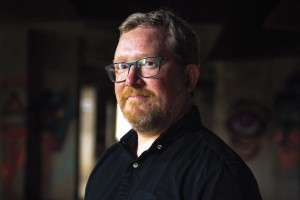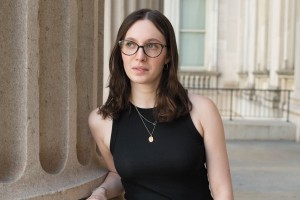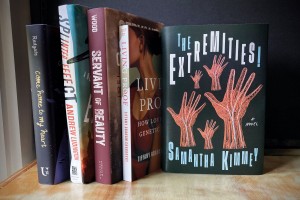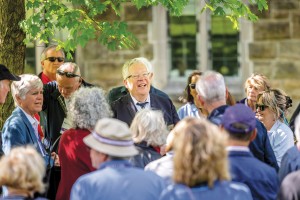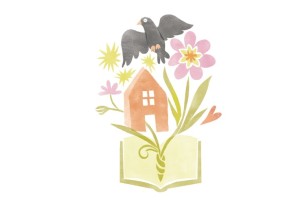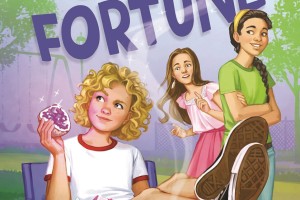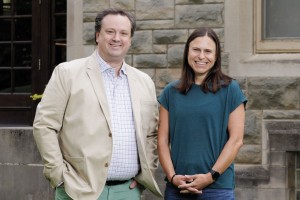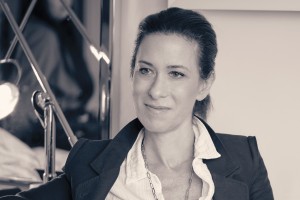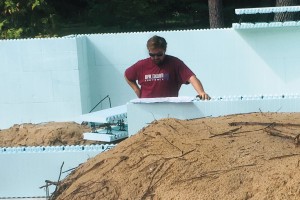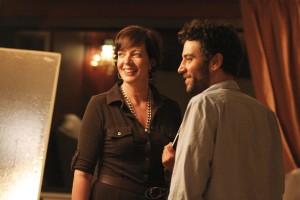The Kenyon Alumni Starter Kit
24 ways to reconnect, stay engaged and make the most of your Kenyon community.
Read The StoryKenyon innovator Elizabeth (Karatz) Faraut ’92 shares how she built her global company, LA LOOP.
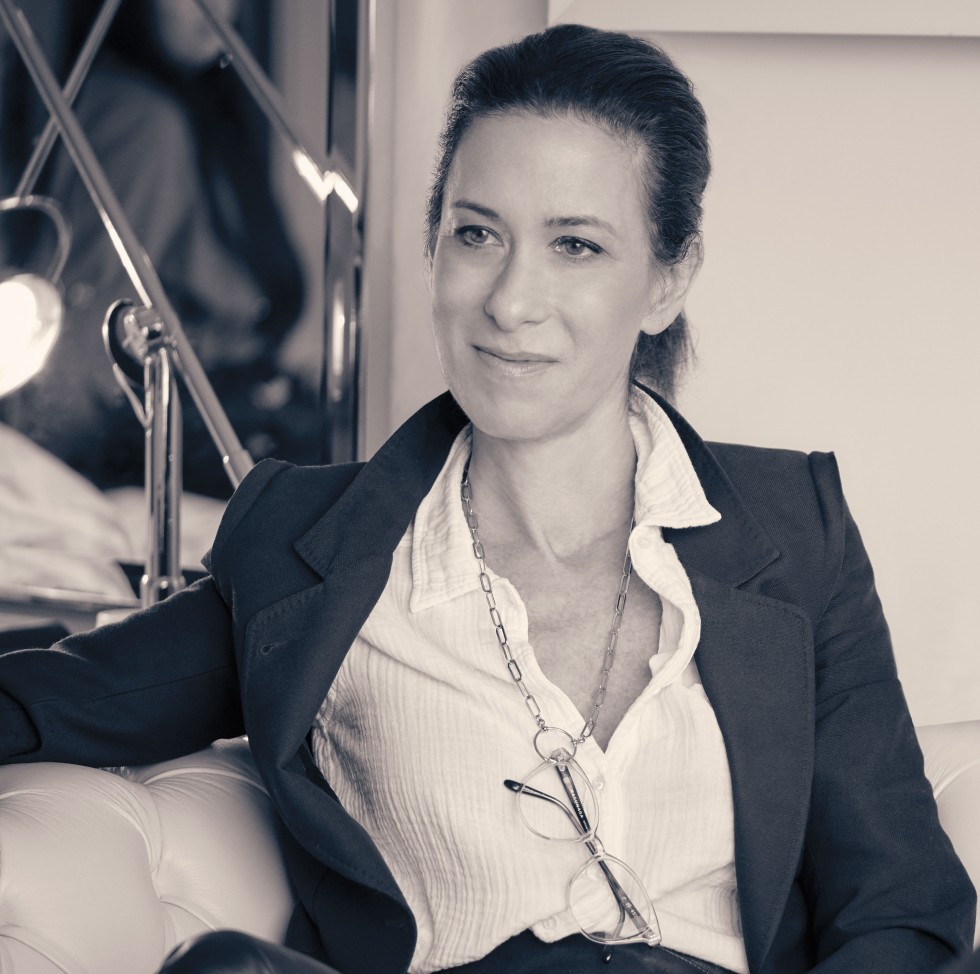
The problem was universal: Elizabeth (Karatz) Faraut ’92 kept losing her glasses. The solution was so simple it was revolutionary: a beautiful necklace that would keep them fashionably secure. “The invention is in these magical hinges,” she said of the patented mechanism that rotates 360 degrees, allowing glasses to stay put on a loop while the necklace moves freely. Since founding LA LOOP in 1999, Faraut has transformed how people keep track of their eyewear, building a brand that’s earned coverage in Vogue and O Magazine, and has been featured in the MoMA Design Store. She spoke with the Kenyon Alumni Magazine about how she built her business from a side project into a global company.
How did the idea for LA LOOP come about?
I met a woman wearing a prototype she had made. I saw it and thought, “This is really interesting — a departure from the masculine black leather products on the market.” I went around and asked different eyewear stores wherever I was traveling, “What do you have to keep track of your glasses?” Everyone said the same thing: “There’s no product on the market. There’s a total need. People lose their glasses all the time.”
For the first year, I worked on LA LOOP on the side and kept my day job. The business grew through the people I met who became ambassadors. That sort of grassroots marketing — we still do that today, 26 years later.
What made you believe in it when others didn’t see it?
Years of working in product design and merchandising, creating something from nothing. I worked in the fragrance business, essentially marketing liquid. Storytelling was absolutely essential for getting through to customers.
LA LOOP was an extension of that, creating demand out of something that did not yet exist. We created a new category, and I love a challenge. I found it thrilling to figure out how to tell a story that conveyed to people they absolutely needed this product.
Describe your career trajectory post-Kenyon.
I worked for Guess Jeans in Los Angeles, traveling a lot and building up the Guess international business. It was an incredible formative experience in my 20s, where I got the entrepreneurial itch.
In the 1990s, when websites were just being formed, my boss said, “I think we need this new thing called a website. Will you go and do it?” It didn’t matter what department you were in; you just had to figure it out. I was 25, 26 years old, and I liked that environment.
When my daughter Juliette, who is now 27, was 1, I realized that being on the road for three weeks out of every month wasn’t sustainable. So I started looking for different opportunities.
Was there ever a moment where you thought, “This isn’t going to work”? How did you get through that?
LA LOOP has been a business with many chapters, and I think that’s why I bring so much vigor and drive to it, because it hasn’t been static. In those moments, I just don’t take anything for granted. I ground myself in the relationships I have built and know that it takes many of us to run this business and to make this product.
We sell 80%-85% of our business to brick-and-mortar stores, many of which closed their doors during the pandemic. I thought, “I am often running out the door looking for my face mask. What if I created a product that kept my mask close to me?” So I created LA MASK, and 2020 and 2021 were our strongest years. LA MASK saved us — I was able to keep everybody on payroll.
How do you scale up while keeping the brand’s personal feel?
Scale to me is personal and deep, as opposed to adding zeros. I believe in handwritten notes. I pick up the phone. I want fewer people in the office so that when the phone rings and I’m walking by, I pick it up. It’s about longer conversations to get to know people as opposed to being transactional.
One of your core values is philanthropy. How did the idea of marrying that with LA LOOP emerge?
Giving back has always been part of who I am. I learned it from my parents around our dinner table when I was younger. The conversation was around civic leaders and non-profit leaders, not celebrities. We grew up exposed to people doing good in our community. That made it part of my life as an adult — an automatic responsibility to be of service to others.
I realized that I had this opportunity with our network to shine a light on the amazing acts of kindness and generosity that the people who wear and make our products live by every day. Our LOOPin Grants program, now in its sixth year, asks both groups to nominate nonprofits in their communities. We award five grants every November on Giving Tuesday.
Were there experiences at Kenyon that shaped how you think about business and problem-solving?
I took an intro to anthropology class my freshman year with Professor Emeritus of Anthropology David Suggs. I was absorbing how people from different cultures lived and created meaning out of their experiences. That first spark — that this was something that lit me up — happened in that classroom.
Another professor who shaped me was Professor Emerita of History Ruth Dunnell, who was my advisor. I minored in Chinese studies and studied abroad in Nanjing junior year with my good friend Kristin (Holzer) Fischer ’92 P’28. Professor Dunnell made the language accessible to us. I now do some of my manufacturing in China.
How did your interest in fashion evolve at Kenyon?
In terms of style, I definitely felt like an outsider. I remember getting on campus and feeling like I wasn’t wearing the clothes everyone else was wearing. My roommate Bettie Teasley ’92 introduced me to L.L. Bean, and my friend Jennifer Lightsey ’92 introduced me to J.Crew.
I was absorbed by how functional but stylish these clothes were. That was my introduction to fashion and function, which has served me well.
What advice would you give to students or young alumni who want to carve their own path, especially if it doesn’t quite fit a particular career mold?
There’s no bad choice. I remember I was excited to sign up for Japanese when the registrar opened, but when I got to the registrar, they said, “Sorry, there are no more spots available, but Chinese is wide open.” I remember feeling like, “This was my path.” I had to relax and trust that things are going to happen as they happen and that I’ll get an experience out of whatever unfolds.
24 ways to reconnect, stay engaged and make the most of your Kenyon community.
Read The StoryLooking back at the work and legacy of Graham Gund ’63 H’81, who died in June.
Read The StoryMeet the alumni entrepreneurs, makers and innovators reshaping the food business.
Read The Story